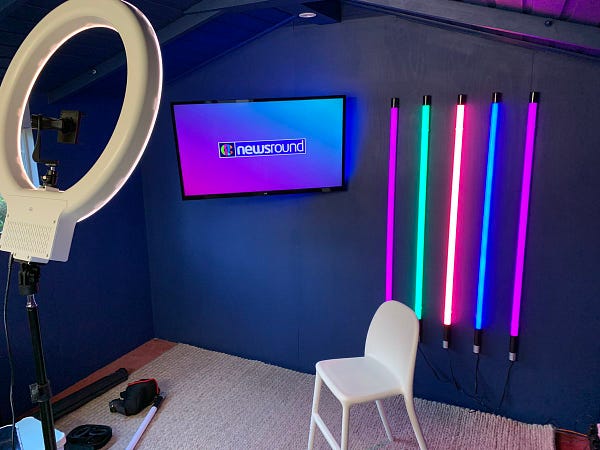1. Streaming licences, sheds and spaceships
Hello, and welcome to the first New Stages newsletter.
I’ve been thinking about doing something like this for a while, and got positive feedback for the idea when I mentioned it to a few people at the tail end of last year. What really spurred me on was seeing some online response to The Stage 100.
Every year, The Stage collates a list of individuals who it feels have been the most influential in theatre (disclosure: although I worked for the paper for nearly 10 years, I was never involved in the list’s formulation). This year, the focus was different and, in the paper’s own words:
Instead of ranking theatre’s most influential people, this year’s edition of The Stage 100 recognises those who have gone above and beyond in the face of the Covid-19 pandemic
The resulting list is extensive, but at the same time could never have hoped to go far enough. So many people and arts organisations have spent the last year thinking on their feet, working out how they can keep going long enough to return to theatre in a post-pandemic world. And others have also taken these times as an opportunity to rethink what theatre looks like in a 21st century, online world. Thus, a list of 100 would barely scratch the surface.
It’s that latter type of person that interests me the most. There are so many positives to come out of a year that can seem overwhelmed with negatives, so let’s find a way to share that positivity.
These first couple of newsletters are likely to be collections of links that I’ve been hoarding over the last few weeks, but in the future, I’m looking forward to talking to some people about what they’ve been up to and how their art has been changing.
If you think you know anyone whose story is worth sharing, please drop me a line at newstages@substack.com.
And if you think you know of anyone who might enjoy reading New Stages, please share this with them!


Livestream music licensing changes coming soon?
PRS for Music, the body that collects royalties on behalf of songwriters, has been grappling with updating their charging structures for a world where more and more performances are being livestreamed – and some of their proposals aren’t going down well.
A report in ArtsProfessional (£subscription) focusses on the concerns of many who feel the changes will be punitive:
Promoters and producers have reacted with alarm, claiming the fees make one of the industry’s sole sources of income at the moment unprofitable, and throttle innovation in livestreaming.
The changes won’t affect small ticketed events: events selling fewer than 50 tickets will be charged a flat fee of £22.50, with the licence going up to £45 for up to 100 tickets sold.
Beyond that, PRS for Music is proposing a progressive levy system (that’s “progressive” as in income tax, not “progressive” as in liberal politics).
It will impose experimental tariffs that rise in line with ticket revenues. Streams that generate up to £50,000 will cost 8% of sales, with the tax climbing to 17% once income exceeds £450,000.
This higher rate is more than four times the 4.2% charged for in-person live shows.
It should be noted that PRS for Music hasn’t formally announced these changes yet, although they indicated to AP that they would be coming in early 2021. They were shared by its Head of Online Nick Edwards as part of a webinar discussion hosted by English Folk Expo. The discussion is on YouTube and includes the point that many smaller streaming events may fall under other types of license that PRS offers (in the video below, the relevant discussion starts 19-20 minutes in).
Shedround
The past year has seen many people working from home, which has also seen an uptick in the number of green screen backdrops. Now, CBBC Newsround journalist Ricky Boleto has gone a step further and converted his garden shed into a mini-studio, tricked out with coloured neon and animated graphics to look more like the show’s normal MediaCity HQ.


Initially revealed in a series of tweets, interest has been such that Ricky has put together a video about both the studio and the reaction to it.
Consume this
From one imaginative repurposing of a confined space to another…
My two great dramatic loves are science fiction and theatre, but it’s rare that the two cross over. Thus it’s a delight when they do, and do it so well as Sinking Ship and Theater in Quarantine’s The 7th Voyage of Egon Tichy.
Based on the first short story by Stanislaw Lem to include his astronaut character Egon Tichy, Joshua William Gelb plays the titular explorer, using a closet in his New York apartment to double for the one-man spacecraft. But after the ship is sent careening into a minefield of time vortices, the small ship begins to get a little crowded…
Gelb’s performance was initially livestreamed, with live graphic overlays and video trickery to enable the actor to interact with past/future versions of himself. A recording of one stream is now available for free on YouTube.
Make sure to also check out a behind-the-scenes look at some of the techniques used, and visit the Sinking Ship website to donate (theatre on YouTube may be free to consume, but it certainly isn’t to produce).
For me, this is the quintessential idea of what streamed theatre can be – a staging that could only work in this way online, taking advantage of techniques unavailable in front of an in-person audience.
(This isn’t the first time a cupboard has proved to be a useful SF prop during lockdown; the Doctor used one effectively back in March…)
If you’ve got a story you think that’d be interesting for New Stages, email me a link at newstages@substack.com, tag me on Twitter (@scottm) or use the hashtag #NewStages. See you next time!



